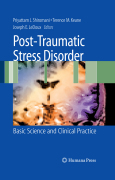
Post-traumatic stress disorder: basic science and clinical practice
Shiromani, P.J.
Keane, T.M.
LeDoux, J.E.
Post-traumatic stress disorder is a psychiatric illness that can occur in anyone who has experienced a life-threatening or violent event. The trauma can bedue to war, terrorism, torture, natural disasters, violence, or rape. In PTSDthe brain areas that are likely to be affected are the hippocampus (memory), amygdala (fear association), the prefrontal cortex (cognitive processing), andthe ascending reticular activating system (arousal). The chemical of interestis norepinephrine, which is released during a stressful event and is part of the fight-or-flight response meant to mobilize the body to action.The objective of this title is to outline the neurobiology of post-traumatic stress disorder and provide treatment strategies for clinicians. The chapter material from this book has evolved from a seminar on PTSD held recently under the auspices of the VA Boston Healthcare System, Boston University Medical Center and Harvard Medical School. Comprehensive overview of the current state of knowledge ofPost Traumatic Stress Disorder (PTSD) Covers epidemiological findings, neurobiology and neurophysiology, and brain imaging findings Details both pharmacological and psychological.treatment strategies INDICE: From the contents Post-traumatic Stress Disorder: Definition, Prevalence, and Risk Factors.- Amygdala and the Neural Pathways of Fear.- Physiology of The Amygdala: Implications For Post-Traumatic Stress Disorder.- Counteracting Molecular Pathways Regulating The Reduction of Fear: Implications For The Treatment of Anxiety Diseases.- Memory In Post-Traumatic Stress Disorder: A Neurocognitive Approach.- Towards Animal Models of Post-Traumatic Stress Disorder.- Post-Traumatic Stress Disorder: From Neurons to Networks.- Arousal Neurons in the Brain.- Hyperarousal and Post-Traumatic Stress Disorder: A Role for the Hypercretin System.- The Locus Coeruleus-Noradrenergic System and Stress: Implications for Post-Traumatic Stress Disorder.- Effect Of Stress On Sleep And Its Relationship To Post-Traumatic Stress Disorder.- Stress Hormones And Post-Traumatic Stress Disorder.
- ISBN: 978-1-60327-328-2
- Editorial: Humana
- Encuadernacion: Cartoné
- Páginas: 410
- Fecha Publicación: 01/03/2009
- Nº Volúmenes: 1
- Idioma: Inglés
